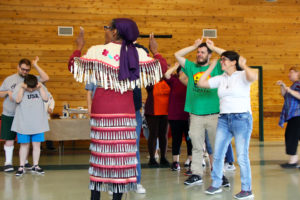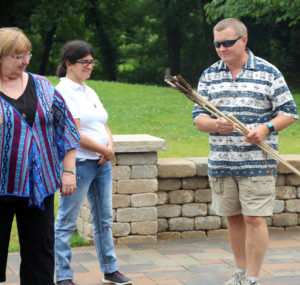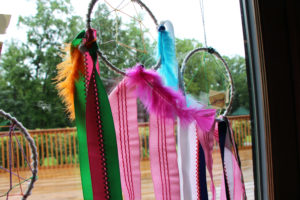Clients, Community Learn About Native American Culture During UCC-related Emmaus Homes’ Festival

Attendees enjoyed learning dances from various Native American tribes.
A Native American Cultural Festival held June 23 at UCC-related Emmaus Homes in St. Charles, Mo., celebrated the culmination of a 5-week course in Native American culture.
The course, part of the EmmausLink program, was open to Emmaus clients and the wider community, and focused on various aspects of Native American culture. EmmausLink, a social and recreational program that connects clients with the community, offers three semesters each year.
“Courses are open to all, but are designed to be accessible to those with cognitive, intellectual, and physical disabilities,” says Shauna O’Toole, Emmaus’ director of development.
The course on Native American culture included classes in Native American dance, food, arts and crafts, and weapons and tools. The festival was a sort of “final exam,” says O’Toole, with participants celebrating and enjoying the skills they learned.
“Most of the instructors focused on Native American groups who lived in our area, such as the Osage,” says Rhonda Schrum, instructor. “This was especially interesting to the students, as many have Native American heritage.”

The festival included a demonstration of an atlatl, a Native American spear thrower.
During the festival, student-made dream catchers, pottery bowls, traditional parfleche (rawhide) bags, drawings of petroglyphs, and illustrations of the Osage spider legend — a story that illustrates how the spider became the symbol of the Osage people — were on display, along with tools and weapons for planting, fishing, hunting, and warfare. The day included a demonstration of atlatl throwing. An atlatl is a traditional spear thrower.
Instructor Saundi Kloeckener, of Cherokee descent, belongs to a Native Women’s Care Circle prayer group. During the festival, she shared stories, songs and dancing from various tribes. “It was wonderful to share stories from many tribal traditions, as well as songs and dances,” she says. “I gave a demonstration of an Ojibwa Jingle Dance. We joined together for a Cherokee Ant Dance, and ended the gathering with a Friendship Round Dance.”
Several Emmaus clients had attended a Native American Powwow in April, but “it was fun to bring a little piece of our Native Peoples’ history and culture to all the participants” in the festival, Kloeckener adds.
During the program, David Lee Szalanski taught “Foods of the Indian Nations.” The class showed off what it learned during a “dramatic Tasting Circle” during the festival, Szalanski says. It was a perfect way “to experience the Native American foods we made in class.” Among the delights sampled were corn pones, fry bread, succotash, Three Sisters Stew, Alaskan Tlingit salmon patties, Muscadine dumplings, Indian pudding, and maple syrup pie.

The activities included handmade dream catchers.
Emmaus client Stephen had a couple of favorite experiences. “I learned how to make dumplings with those big grapes [muscadines], and the Ant Dance was fun,” he says.
The course and festival were a success thanks to the many donors and participants, says O’Toole.
At Emmaus, “we believe people with disabilities should be included in their communities,” she says. “EmmausLink is open to any member of the community, whether they receive services from Emmaus or not, and whether they have a disability or not.”
Compelled by faith in Jesus Christ, Emmaus enriches the lives of individuals of all beliefs, with cognitive or developmental disabilities, by fostering independence, inclusion and self-advocacy.
Join Our Mailing LIst
"*" indicates required fields
Follow on Facebook
New Resident Finds Belonging at Emmaus Homes - CHHSM
www.chhsm.org
Heather’s journey toward independence has been nothing short of inspiring. Since moving into her new home last year, Heather’s world has expanded in ways she never imagined. Leaving the familiarit...